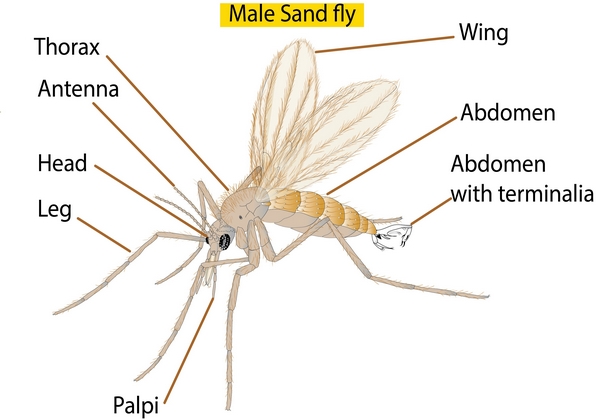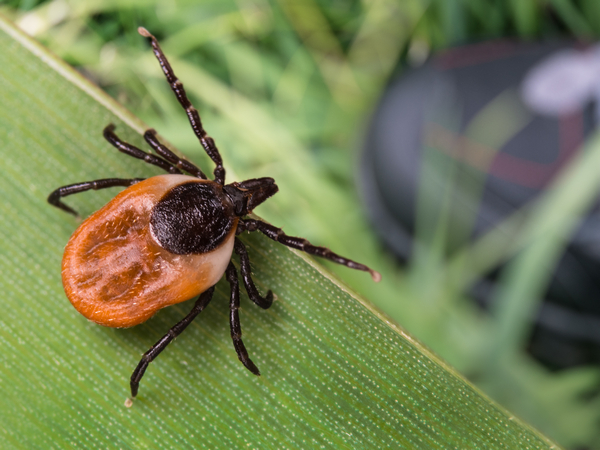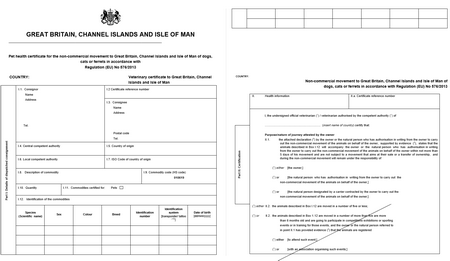Animal health certificates, pet passports and taking dogs abroad
The rules on travelling with your dog to EU countries such as France, Spain, Germany, Portugal, Ireland, Italy and the Netherlands changed in 2021. Pet passports issued in the UK are no longer valid, and dog owners must now meet specific criteria. Your dog needs to:
- be microchipped
- have a valid rabies vaccination
- be treated for tapeworm if you're travelling to Ireland, Northern Ireland, Finland, Norway or Malta
- have an animal health certificate (AHC)
Travelling with a dog to countries outside of the EU
If you're going to a country outside of the EU, such as the US, Turkey or Egypt, you'll need an export health certificate (EHC). You'll also be expected to complete an export application form (EXA) if you're in England, Scotland or Wales. It’s your responsibility to research the requirements of the country you’re travelling to, as most countries have different requirements.
If you’re looking to emigrate or relocate permanently, there are companies, such as PetAir, who can help with the process.
What are animal health certificates?
Animal health certificates are verified documents which prove that your dog is healthy and has had all the vaccinations and treatments required to travel abroad. It includes a record of your dog's vaccination dates and confirms that they're microchipped and in general good health. It also provides information about their age, breed, and size.
The certificate must be in the language of the EU country you're entering first — and not your final destination. Your vet should be able to help with this as they will have access to the criteria for each country.
Members of Pet Health Club™ receive a 10% discount on AHCs. Speak to your local practice for more information.
Who can authorise animal health certificates in the UK?
They can only be issued by vets authorised by the Animal and Plant Health Agency (APHA) who hold the appropriate qualification. These vets are called official veterinarians (OVs)
Where can I get an animal health certificate near me?
The easiest way to find out if your local vet can issue an AHC is to check their practice website or contact them directly. If they can't, they should be able to direct you to a nearby practice that can.
You can use our helpful find a vet function for this.
How long does an animal health certificate last?
You must travel to your primary destination within 10 days of the AHC being issued. They are valid for onward travel within the EU, or return to the UK, for four months. If you return to the UK, your next trip will require a new AHC, even if you are within the four month period.
This can be frustrating because, as non-EU citizens, we can only stay in the EU for up to 90 days per 180-day period. So, suppose you decide to return to your home in the UK within 90 days of your trip starting but travel back to the EU during that same 90-day period. In that case, you will need another AHC, regardless of whether you still have time remaining on your original certificate.
This is the most significant difference between AHCs and pet passports. Pet passports are valid for three years and offer unlimited travel as long as all the information and vaccinations are up to date.
What is the cheapest animal health certificate near me?
There is no national fixed price. The price charged is at the practice's discretion and can be up to £300. It’s worth noting that vets must undergo significant initial and ongoing training before being authorised to issue AHCs. They are also complex documents which require a considerable amount of the vet’s time to complete.
Members of Pet Health Club™ receive a 10% discount on AHCs. Speak to your local practice for more information.
How old does my dog need to be to get an animal health certificate?
Dogs must be 15 weeks old to get an AHC and not 12 weeks, as is often stated. That's because puppies can't get an AHC until 21 days after their rabies vaccine — and they can only get vaccinated against rabies when they're at least 12 weeks old.
You should consider whether travelling abroad with such a young puppy is in their best interests. Again, your vet will be able to advise on this.
How long does it take to get an animal health certificate?
It's vital to prepare for taking your pet abroad well in advance of your departure date. Getting an animal health certificate at the last minute can be difficult. Some vets have lengthy waiting lists for AHC appointments and recommend booking at least four to six weeks ahead. You may also find your vet will only complete an AHC if you're already a registered client.
As the AHC application form is long, you may be expected to submit information before your vet appointment — and this appointment may last upwards of 45 minutes.
What information is on an animal health certificate?
- Your details
- Description of your pet
- Rabies vaccination details (your dog must have been vaccinated in the past three years and at least three weeks prior to the AHC being issued)
- Tapeworm treatment (doesn’t apply to pet owners travelling to the UK from Finland, Ireland, Northern Ireland, Malta or Norway)
- Tapeworm treatment (all dogs travelling into the UK require tapeworm treatment, except if coming from Finland, Ireland, Northern Ireland, Malta or Norway — but tapeworm treatment is required for dogs travelling to those countries)
- Intended country of entry into the EU (AHCs must be in the language of the EU country you are entering)
- Rabies blood test (only if travelling from an unlisted country outside of the EU)
Timeline for going to an EU country with your dog
- At least 6 months before travel
- Research requirements for countries you plan to visit
- Discuss travel plans with your vet
- Find out if your practice can issue AHCs. If not, find one that can
- At least 6-8 weeks before travel
- Book appointment at your vet, for at least 21 days before travel, for rabies vaccinations and flea and worm treatment
- Book appointment at your vet, for between 1-10 days before travel, for AHC
- At least 3-4 weeks before travel
- Attend vet for rabies vaccination, other relevant vaccinations and flea and worm treatment
- 1-10 days before travel
- Attend vet for AHC appointment, taking proof of your dog’s microchipping and vaccination history
- 1-5 days before travel
- Get tapeworm treatment if travelling to Ireland, Northern Ireland, Finland, Malta or Norway
What do I do when I arrive in the EU with my dog?
You must show evidence of your pet's AHC, microchip, vaccinations (and tapeworm treatment if travelling to Finland, Ireland, Northern Ireland, Norway or Malta).
What about bringing pets to the UK?
You can only re-enter Great Britain with your pet if they've been microchipped, vaccinated against rabies and issued with a valid pet passport or AHC. Between 24 and 120 hours (one to five days) before you return, your dog must also be treated for tapeworm by an official vet. The vet must record this treatment in section two of your AHC. You don't need to do this if you're returning from Northern Ireland, Ireland, Malta, Finland or Norway.
If you do not follow these rules, your dog may be refused entry or placed in quarantine. If you're going abroad for at least 24 hours but fewer than five days, your dog must be treated for tapeworm before you travel and again within 28 days of your return.
How many dogs can I take abroad?
You can travel with up to five pets (dogs, cats or ferrets). The only exception is when you're attending a competition, exhibition or sporting event — but you must provide evidence of this and all of your pets must be at least six months old.
What else do I need to do before taking dogs abroad?
Many of the parasites prevalent in Britain are also at large in Europe. So if you're a Pet Health Club member or similar, and your dog is up to date with their vaccinations and preventative healthcare treatments, they should be well protected.
Having said that, there are some parasites, particularly in Mediterranean countries such as Spain, Portugal and Italy, that you may wish to take additional precautions against.
This interactive map on the ESCCAP website provides sound country-specific advice on parasites, diseases and recommended treatments when travelling with your dog.What are the main pet parasite risks in Europe?
Sandflies, mosquitoes, worms and ticks are the four main enemies of your pet while travelling in Europe.
Diseases dogs can get abroad
Disease Transmitted by Clinical signs Vaccine? Precautions Leishmaniasis Sandflies Possible signs include skin lesions, fever, thirst, weight loss, diarrhoea, sickness, nose bleeds Yes Use products to repel sandflies, avoid going out at dusk and keep dogs inside at night Heartworm Mosquitoes Signs can include coughing, breathing difficulties, exercise intolerance Yes Heartworm preventative medication, mosquito control Tapeworm Fleas Scooting anus across the ground, possible weight loss No Regular flea treatment, keep away from dead animals Babesiosis Ticks Pale gums, dark urine, anaemia Not in UK Effective vet-prescribed tick control as offered on Pet Health Club Encephalitis Ticks Tremors, seizures, fever No Effective vet-prescribed tick control as offered on Pet Health Club
Heartworm
Heartworm infections in dogs (dirofilariasis) are found mainly in the south of France, Spain, Portugal and Greece. The heartworm parasite, which travels around the blood of infected dogs, has spread slowly north in recent years but has not reached the UK. Heartworms are transmitted by mosquitoes and can take six months to reach a dog's heart, so even pets who haven't travelled for some time may still be at risk from severe illness and even death. Signs of heartworm infection include coughing, breathing difficulties and intolerance to exercise.
There are preventative treatments for heartworm, including appropriate mosquito control and worming products, which you should consider if you're taking dogs abroad. Seek advice from your vet on the best measures to take.
Tapeworm
There's one species of tapeworm that's common in parts of Europe, including France and Germany, that dogs can carry without showing any symptoms. It's called Echinococcus Multilocularis, and it can cause serious illness in humans. The UK is currently designated as free from this dangerous parasite, which is why it is so important that your dog is treated with an appropriate veterinary wormer one to five days before returning home.
Sandfly

These insects are predominantly found in woodland areas such as forests and gardens in southern European countries such as Spain, Portugal, France, Greece and Italy. They can transmit a potentially fatal disease called leishmaniasis, which causes skin lesions, wasting and eventually kidney failure. Although sandflies carrying the leishmaniasis parasite aren't found in the UK, numerous cases of dogs returning to the UK with the disease have been reported. It’s worth noting that leishmaniasis can also affect people. There has been no known dog to human transmission as yet (humans are also infected via sandfly) but immunocompromised people, the young and the elderly are advised to avoid contact with a positive dog.
Vaccines are available that reduce the risk of your dog developing leishmaniasis, as are protective measures to prevent sandflies from feeding on your dog. Speak to your vet about the best course of action.
Ticks

Ticks in Europe can tansmit serious diseases, including babesiosis (found in France and other European countries) and ehrlichiosis (prevalent in Mediterranean countries). Tick control for dogs can be prescribed by your vet and is available through comprehensive preventative healthcare plans such as Pet Health Club.
Rabies
Rabies is a deadly viral disease found in more than 150 countries across the world. Dogs must be vaccinated against this virus at least 21 days before they're due to travel. Vets cannot issue an AHC unless this vaccination has been given.
Summary
While Brexit has made the requirements for travelling with your dog to France, Spain, Italy and other EU countries a little more complicated, it is still possible if you prepare in advance and discuss your plans with your vet several weeks ahead of your expected date of travel.
How to find an animal health certificate near me
To find the best place to get an animal health certificate, get in touch with your local vet.
Find your nearest vet offering animal health certificates by using our Find a Vet page, or speak to a vet online using Online Vets.




